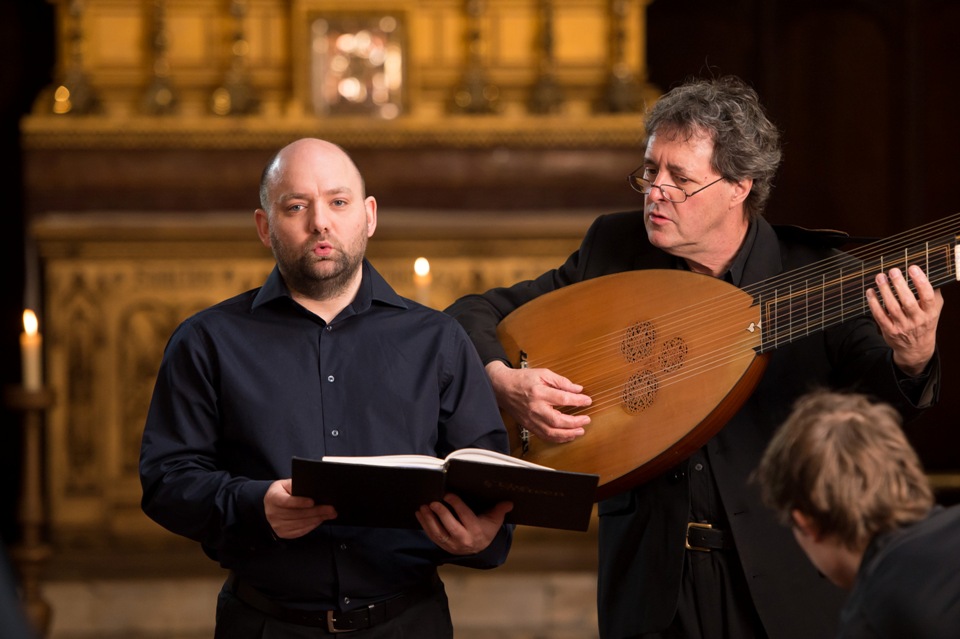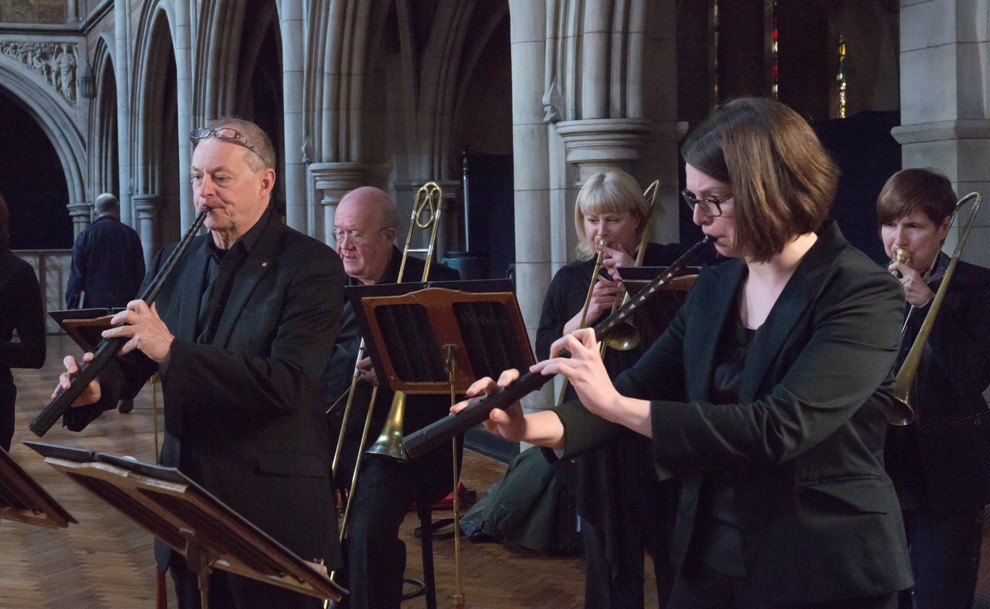Monteverdi Vespers, The Sixteen, Christophers, Winchester Cathedral | reviews, news & interviews
Monteverdi Vespers, The Sixteen, Christophers, Winchester Cathedral
Monteverdi Vespers, The Sixteen, Christophers, Winchester Cathedral
One of music's iconoclastic glories breaks through cathedral murk in searing performance

It has to be the ultimate cornucopia of choral and early-instrumental invention. So long as the musicians immerse themselves in the beauty of a strange adventure, it doesn’t matter where you hear Monteverdi’s Vespers of 1610: however selective the acoustic, you’ll always get something out of one rare combination of sounds or another.
If the Winchester experience began in the aural equivalent of a dimly-lit room, it ended in total incandescence. The great opening blaze with the tuckets adapted from L’Orfeo’s opening toccata sounded murky from my seat seven rows and a crossing space back from the performers in their surprisingly narrow space, their sound seeming to fall dead some way in front; to catch the real opulence, you had only to look upwards at the nave’s stupendous lierne vaulting – constructed circa two centuries before the Vespers’ composition, but a parallel forest of invention.
 Soon, though, tenor Mark Dobell and chitarrone player David Miller (pictured right) arrived within a metre of us and unfolded the first of the "sacred concertos" which in the 1610 edition replace the usual plainchant antiphons heard in St Mark’s Venice, and melted me with florid urgency. It wasn’t exactly voluptuous beauty for the first of the ravishing settings of the Song of Solomon, and when sopranos Grace Davidson and Charlotte Mobbs took up the lovesong strain in “Pulchra es” it was more a matter of penetration, if you’ll forgive the term in this context, than sheer sensuousness.
Soon, though, tenor Mark Dobell and chitarrone player David Miller (pictured right) arrived within a metre of us and unfolded the first of the "sacred concertos" which in the 1610 edition replace the usual plainchant antiphons heard in St Mark’s Venice, and melted me with florid urgency. It wasn’t exactly voluptuous beauty for the first of the ravishing settings of the Song of Solomon, and when sopranos Grace Davidson and Charlotte Mobbs took up the lovesong strain in “Pulchra es” it was more a matter of penetration, if you’ll forgive the term in this context, than sheer sensuousness.
The penetrating force became a virtue in the earthy assumption of seraphim from Dobell and Jeremy Budd, joined by bass Ben Davies for an evocation of the Trinity. And from this point onwards the Sixteen hit their stylistic stride, one of urgent expression to drive home the revolutionary nature of Monteverdi’s “I can do anything”, and I was hooked, flipped upside down, dazzled. There was no hint here of the "Anglican primness" excoriated in Stephen Walsh's parallel review of a very different Vespers last night. The big choral settings either side of the interval stamped and danced, the special guest appearance of the Winchester Cathedral Choir trebles to hold the seraphic chant in the “Sonata sopra Sancta Maria” gave another holy turn of the screw, and the players were unleashed to show their full virtuosity in the “Ave maris stella” followed by what has to be the most resourceful Magnificat before Bach.
 As is customary in most performances of the Vespers, this was the more opulent of the two final settings in an admirably full realisation of the published 1610 edition (hopefully the time is past of ascetic, purifying authenticists weeding out the gloriously profane from the sacred and sticking in boring old plainchant – boring in this context, that is, though its simplicity has a place elsewhere). And while the cathedral acoustics may have muddied earlier ensembles, they seemed to revel in Monteverdi’s pared-down layering of cantus firmus with sheer instrumental and polyphonic brilliance.
As is customary in most performances of the Vespers, this was the more opulent of the two final settings in an admirably full realisation of the published 1610 edition (hopefully the time is past of ascetic, purifying authenticists weeding out the gloriously profane from the sacred and sticking in boring old plainchant – boring in this context, that is, though its simplicity has a place elsewhere). And while the cathedral acoustics may have muddied earlier ensembles, they seemed to revel in Monteverdi’s pared-down layering of cantus firmus with sheer instrumental and polyphonic brilliance.
The lower resonances of Jan Spencer’s violone and the supernaturally solemn sackbuts were beautifully bolstered; the dulcian and cornets which hadn’t blazed at the start now had their moment in the sun (brass ensemble pictured above), and solo fiddling led by Sarah Sexton shot up heavenwards through the glorious vault. Budd, ushering in from the pulpit the last of the many changes Monteverdi rings on each Gloria, led the final fireworks. It was giddying stuff, seemingly possessed – no small thanks to Harry Christophers - of that moment in live performance which goes beyond the bounds of normality. I want to hear this interpretation again and (thanks to the imminent CDs, as well as a promised television documentary) again.
- Four more performances in November including London's Cadogan Hall. Some tickets still available for Rochester, Guildford and Peterborough cathedral performances in January
rating
Explore topics
Share this article
The future of Arts Journalism
You can stop theartsdesk.com closing!
We urgently need financing to survive. Our fundraising drive has thus far raised £49,000 but we need to reach £100,000 or we will be forced to close. Please contribute here: https://gofund.me/c3f6033d
And if you can forward this information to anyone who might assist, we’d be grateful.

Subscribe to theartsdesk.com
Thank you for continuing to read our work on theartsdesk.com. For unlimited access to every article in its entirety, including our archive of more than 15,000 pieces, we're asking for £5 per month or £40 per year. We feel it's a very good deal, and hope you do too.
To take a subscription now simply click here.
And if you're looking for that extra gift for a friend or family member, why not treat them to a theartsdesk.com gift subscription?
more Classical music
 Classical CDs: Voice flutes, flugelhorns and froth
Baroque sonatas, English orchestral music and an emotionally-charged vocal recital
Classical CDs: Voice flutes, flugelhorns and froth
Baroque sonatas, English orchestral music and an emotionally-charged vocal recital
 Kanneh-Mason, Britten Sinfonia, Shave, Milton Court - a grin and a big beaming smile
A pair of striking contemporary pieces alongside two old favourites
Kanneh-Mason, Britten Sinfonia, Shave, Milton Court - a grin and a big beaming smile
A pair of striking contemporary pieces alongside two old favourites
 theartsdesk at the New Ross Piano Festival - Finghin Collins’ musical rainbow
From revelatory Bach played with astounding maturity by a 22 year old to four-hand jazz
theartsdesk at the New Ross Piano Festival - Finghin Collins’ musical rainbow
From revelatory Bach played with astounding maturity by a 22 year old to four-hand jazz
 First Person: Manchester Camerata's Head of Artistic Planning Clara Marshall Cawley on questioning the status quo
Five days of free events with all sorts of audiences around Manchester starts tomorrow
First Person: Manchester Camerata's Head of Artistic Planning Clara Marshall Cawley on questioning the status quo
Five days of free events with all sorts of audiences around Manchester starts tomorrow
 Goldscheider, Brother Tree Sound, Kings Place review - music of hope from a young composer
Unusual combination of horn, strings and electronics makes for some intriguing listening
Goldscheider, Brother Tree Sound, Kings Place review - music of hope from a young composer
Unusual combination of horn, strings and electronics makes for some intriguing listening
 theartsdesk Q&A: composer Donghoon Shin on his new concerto for pianist Seong-Jin Cho
Classical music makes its debut at London's K-Music Festival
theartsdesk Q&A: composer Donghoon Shin on his new concerto for pianist Seong-Jin Cho
Classical music makes its debut at London's K-Music Festival
 Helleur-Simcock, Hallé, Wong, Bridgewater Hall, Manchester review - moving lyricism in Elgar’s concerto
Season opener brings lyrical beauty, crisp confidence and a proper Romantic wallow
Helleur-Simcock, Hallé, Wong, Bridgewater Hall, Manchester review - moving lyricism in Elgar’s concerto
Season opener brings lyrical beauty, crisp confidence and a proper Romantic wallow
 Kohout, Spence, Braun, Manchester Camerata, Huth, RNCM, Manchester review - joy, insight, imagination and unanimity
Celebration of the past with stars of the future at the Royal Northern College
Kohout, Spence, Braun, Manchester Camerata, Huth, RNCM, Manchester review - joy, insight, imagination and unanimity
Celebration of the past with stars of the future at the Royal Northern College
 Jansen, LSO, Pappano, Barbican review - profound and bracing emotional workouts
Great soloist, conductor and orchestra take Britten and Shostakovich to the edge
Jansen, LSO, Pappano, Barbican review - profound and bracing emotional workouts
Great soloist, conductor and orchestra take Britten and Shostakovich to the edge
 Jakub Hrůša and Friends in Concert, Royal Opera review - fleshcreep in two uneven halves
Bartók kept short, and a sprawling Dvořák choral ballad done as well as it could be
Jakub Hrůša and Friends in Concert, Royal Opera review - fleshcreep in two uneven halves
Bartók kept short, and a sprawling Dvořák choral ballad done as well as it could be

Add comment